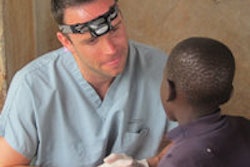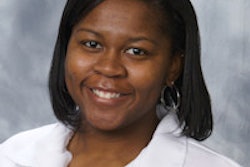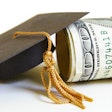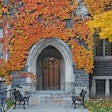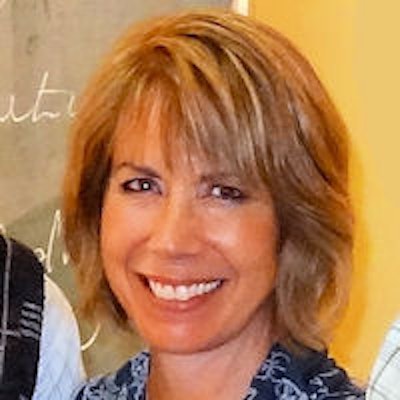
When depression took the son of Kim Harms, DDS, and nerve damage in her hand took away her ability to work with patients, she needed something to replace the painful loss of her child and her life's work. Then, Dr. Harms heard about Rwanda, the African country that is struggling to overcome the horrific genocide that took the lives of nearly a million people in 1994.
Inspired by the Rwandans' resilience and determination to rebuild their country, Dr. Harms decided to establish a memorial library in honor of her son by bringing much-needed books, including dental textbooks, to help students become dentists and lawyers.
 Dr. Kim Harms has dedicated seven Eric James Harms Memorial Libraries in Rwanda. Left to right: Dental student Mahina Arsene, Dr. Kim Harms, and Dr. Ibra Muhumuza, a professor at the University of Rwanda School of Dentistry.
Dr. Kim Harms has dedicated seven Eric James Harms Memorial Libraries in Rwanda. Left to right: Dental student Mahina Arsene, Dr. Kim Harms, and Dr. Ibra Muhumuza, a professor at the University of Rwanda School of Dentistry.
"I had been helped tremendously by books written by Rwandans and could now express my gratitude by sending books that might impact the lives of Rwandans whose stories had helped me," recalled Dr. Harms, who practiced in Farmington, MN. (Her husband, Jim Harms, DDS, with whom she practiced for 30 years, still treats patients there.)
In August 2012, she travelled to Rwanda to dedicate seven Eric James Harms Memorial Libraries. There, Dr. Harms visited collectives where Tutsi women, whose husbands had been killed in the genocide, had joined with Hutu women whose husbands had committed the killing and were now in jail.
"It's amazing to look at how the human heart can forgive," Dr. Harms said. "They realize in order for their country to thrive and survive they have to forgive and reconcile. It's one of the reasons I love Rwanda."
She learned that only 49 lawyers were left in Rwanda because so many attorneys had been targeted in the genocide. "I was amazed there was such a book famine," Dr. Harms recalled. "They hardly had any books for this law library."
Rwanda switched to English as the official language only in 2009, so there were few books in English.
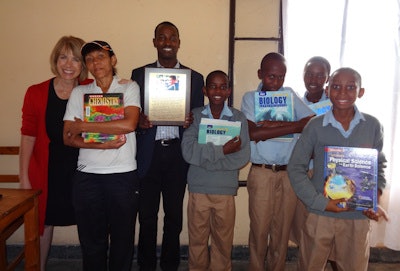 Dr. Harms with students from the St. Peter Igihozo school and Father Remy, who works with Dr. Harms to get the books cleared for the school.
Dr. Harms with students from the St. Peter Igihozo school and Father Remy, who works with Dr. Harms to get the books cleared for the school.Working through the Books for Africa program, Dr. Harms has sent law books to law schools in Butare and Kigali, the capital.
"To see these young people who could be helped by these law books because they wanted to go back and help their villages rebuild was amazing," she recalled. "You don't really see a lot of Rwandans in America, because most of them want to stay and rebuild their country."
Working with the Rwandan ambassador, Dr. Harms then visited the dental school in Kigali, which is now the University of Rwanda College of Medicine and Health Sciences School of Dentistry. "I was impressed to see a small but modern clinic," she said. "There was even an advertisement for orthodontic aligners."
There are only 30 to 40 dentists now to treat more than 11 million people in Rwanda, Dr. Harms noted. Since the dental school only offered four-year training for dental therapists, all Rwandan dentists were trained outside the country. But in September, the University of Rwanda began its bachelor's program for dental surgery with 15 students in a five-year program followed by a one-year internship.
The Clinton Foundation has sent a team of academics to improve the curriculum, she said.
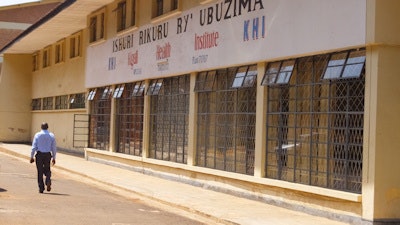 The Kigali Health Institute is now the University of Rwanda College of Medicine and Health Sciences.
The Kigali Health Institute is now the University of Rwanda College of Medicine and Health Sciences.Dr. Harms worked with Ed Hewlett, DDS, a professor who runs a diversity and outreach program at the University of California, Los Angeles (UCLA), to set up a program that allowed UCLA's dental students to deliver lectures via the Internet to dental students in Kigali. "They can interact because they're doing it electronically," she noted. "The students are working together and getting a bit of each other's culture."
Now, Dr. Harms is shipping 2,000 dental textbooks covering periodontics, restoratives, and dentures. The first shipment last year included 300 Merck manuals, comprehensive handbooks for doctors. She is also sending 25 laptops, enough for each student in the dental class.
The Rwandan students have already developed their own Web page, Dr. Harms proudly noted.
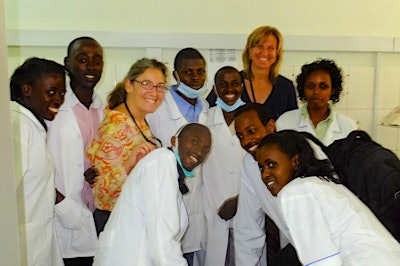 Dental students at the College of Medicine and Health Sciences School of Dentistry.
Dental students at the College of Medicine and Health Sciences School of Dentistry.Since starting the project two years ago with the help of a friend, Dr. Harms has sent 80,000 books -- including 2,000 dental textbooks -- and 50 computers that she and others cajoled in donations.
"These books are amazingly precious commodities, like gold," Dr. Harms said, noting that each book is estimated to be read 400 times.
She is still looking for books on oral surgery, trauma, and oral pathology. Those who want to help can get information via the Books for Africa website.
“I can't help by doing dentistry in Rwanda, but I ended up having the ability to provide books and help in their education.”
How long will her Rwandan project continue? " 'Til my stubby arthritic fingers can't push the computer keys anymore," Dr. Harms laughed. "This is my retirement project."
She pointed out that people who want to help impoverished countries don't have to travel to far off places.
"You don't have to go to Africa, but I found the opportunity and went. We all have the opportunity to make a difference, even if it's in only one other life. I lost my profession and my son in a few years, and when you've lost so much, it's so easy to focus on that," she said.
"But if you can train yourself and work hard -- and the Rwandans taught me a thing or two about loss -- you can turn that around and focus on what you have. I can't help by doing dentistry in Rwanda, but I ended up having the ability to provide books and help in their education."
Dr. Harms noted that for every book she received, she had to ask five or six people. "You just have to keep going and not get discouraged," she said.
Dr. Harms urged other dentists nearing retirement to look for ways to use the knowledge and skills they've acquired.
"Baby boomers are wondering what they can do now that we're getting older," she said. "We have the background and ability to help in ways that we never thought possible, and that's what I'm finding out."




